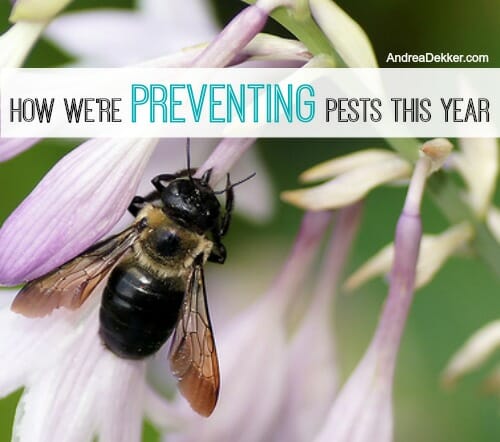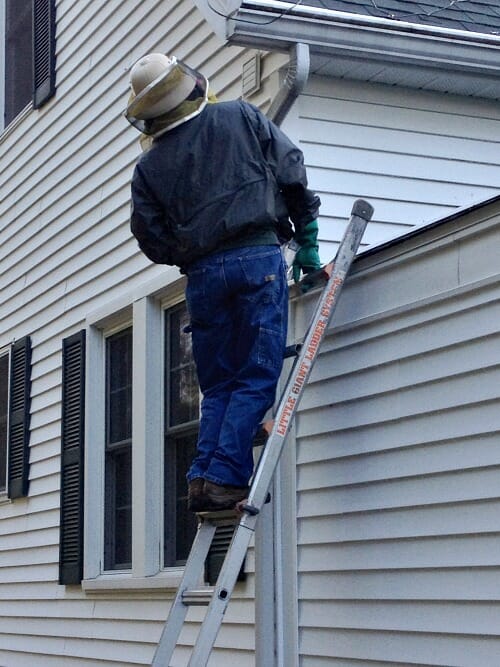Over the past several years, Dave and I have spent hundreds of dollars (probably over $1000) on pest removal — everything from bees and bats to moles and mice. We even had a chipmunk living in our basement for a whole week this past fall after it ran right through our back door (the kids left it open)!
Part of the problem is certainly the fact that our house is 125 years old, with multiple additions, and probably even more little cracks and holes for pests to wiggle their way inside.
Another part of the problem is most likely our own doing — planting so many flowers and veggies that attract bees, bugs, moles, and other critters.
However, it’s still gross and it still bothers me.
Last year, the bees, wasps, and hornets were particularly bad — we had 5 different areas that were affected (including an underground nest) so we finally broke down and called our pest control guy (he’s practically on speed dial for us now!)
After he treated all 5 of the bee areas, and after we wrote him a $250 check, he said, “you know, you guys should really just have us come out and do some preventative work in the spring so you don’t have issues all summer long.”
I was shocked when he quoted me the price of the preventative treatment — only about $150 for our entire house, garage, and outbuilding!
So for half the price of one home visit to exterminate our pests, we could have our entire home treated to PREVENT the pests from getting into our home for the entire summer and fall! Sounds pretty good to me!
We currently have our pest control guy (Schultz Pest Control) scheduled to come out sometime in the next few weeks… and he apparently guarantees this preventive treatment effectiveness through the fall… if we have any issues, he’ll take care of them at no charge!
.
For those of you wondering where I’m going with this post, the point is not necessarily for everyone to go out and have your homes sprayed to prevent bees and other pests (although that might not be a bad idea if you have bee issues).
Instead, I’d like to encourage you to think about ways you can PREVENT issues before they happen — instead of constantly playing ‘catch up’ and trying to extinguish “fires” after they start.
Plan your meals at the beginning of the week so you don’t have to stress and worry about “what’s for dinner” EVERY SINGLE DAY.
Look over your family’s schedule for the next week and take note of extra busy days so you can plan ahead and prepare now instead of waiting until the very last minute.
Work ahead the night before so you aren’t frantically rushing around in the morning.
I could probably share 50 examples of different ways I try to plan ahead in an effort to PREVENT issues, problems, chaos, and stress before it enters my life. Of course, it doesn’t always work — but most of the time it does!
It’s amazing how much better I feel knowing that many of our pest issues will be resolved with this simple preventative measure — something that doesn’t cost me a ton of money or take up much of my time. Dave and I will both save ourselves so much stress and energy looking for bee and wasp nests, trying to keep our kids away from those areas, wondering if it’s really an issue or just a few bees, wondering if we should call the pest guy or wait a few more days, etc. etc.
I guess the age-old saying “an ounce of prevention is worth a pound of cure” really does hold true for so many different life situations (even pests!)



Pixie508 says
I wish ours was as cheap!! We have a wood sided house, and the carpenter bees drill, and they can destroy our house. So, every year, when we start to see them, we call, and we get a season contract. for about $250 (they don’t like to come out until there is evidence of activity), they come and spray, but if the bees come back, or we see a nest, or anything else, they’ll come back over and over for the whole year. We had a nest in the ground 2 summers ago, they handled it under the same cost. So while ours is a little more, I’ve found it worth the cost, because I know if I have an issue, I pick up the phone, and within 48hrs, I’ve got a tech at my door handling it at no additional cost. It’s worth it for us to pay one price, and have them at our finger tips. And, I love supporting a local small business too 🙂
Andrea says
this actually sounds like a pretty good deal for your situation — and it IS sort of “preventative”. You know you’ll have a problem so you buy the year-contract to protect yourself all season long!
Pixie508 says
Yup! Paying for multiple visits would cost far more than paying a little more up front for the whole year! Last year, they drilled, and had gotten into the wall! So, they came and sprayed into the wall and sealed up the hole, and came back several weeks later to make sure they’d really gotten them all – their customer service is always great.
Chris K in Wisconsin says
Andrea, I understand pretty much all of what you are saying, but PLEASE don’t consider, or teach your kids, that bees are pests. Without them we will have no food. They can be considered a nuisance at times, and especially when you have kids and pets….but they are necessary for the flowers and our food supply. Now, certainly if you have nests in the ground or in your walls etc. you need to get them removed, but please don’t randomly hurt the bees who are only doing what God intends for them to do as the go from flower to flower. Teach the kids to respect their space so they don’t get stung, but be sure that they understand why God sent them to work in our gardens.
We had an abundance of bees last year and I was thrilled. They have been dying out so quickly, that when we see them returning we should celebrate. Their mission here on earth is quite important to each of us.
Andrea says
Well, when they are building nests inside the walls of our house, they ARE pests 🙂
Christine from The (mostly) Simple Life says
Prevention is definitely a good way to live. My parents have always been good about taking care of things before they become a problem and it’s so smart. They always take good care of their vehicles so that there’s never a big surprise problem.
The house we just bought had a small termite issue before we bought it, which makes me super paranoid, so I’m thinking I’ll take some extra preventative measures to keep it from happening again.
Andrea says
yes, even things like changing the furnace filter or getting regular oil changes are so small but can extend the life of very expensive furnaces and vehicles!
Karen says
We have loads of wasps and hornets as well as bees, but I never consider the bees pests, only the wasps and hornets. For the past several years, while the wasps and hornets were having their way, we were finding dead and dying honey and bumble bees on the ground everywhere. I’m all for controlling the wasps and hornets, which are aggressive and nasty, but please don’t consider bees a pest, they don’t “attack” the way wasps and hornets will. They pollinate and make honey. We use caulking and screening to prevent them entering buildings, hang a fake wasp’s nest near the deck, hang traps (ick) away from areas we use and regularly check eaves and trees for nests under construction to eliminate them immediately. My sister uses a paper lunch bag opened up and tied shut at the top as a fake nest – deters houseflies too, common wasp prey. I realize your house, along with all it’s lovely character, might require special treatment, because sometimes they just do. I wish the black widow spiders we also get were as easy to control. I am spraying “their” spots early, before the bees are out in numbers, as the spray for the spiders (I only spray black widows) will kill bees as well.
Tip for if the kids leave a door open and wildlife enters again. Leave the exit bright, make everything else as dark as possible. The creature will head for the light. Our kids brought a bird inside.
Karen says
Just came back to clarify, if I were really uncomfortable outdoors or had nests inside any structure or underground, I would spray.
I noticed that staining our fencing eliminated wasps that chewed on the raw wood for nest building material. Also wooden tool handles. Any finish works. Wasps and hornets are attracted to fruit and meat smells. Keep the BBQ clean, don’t leave fruit to rot.